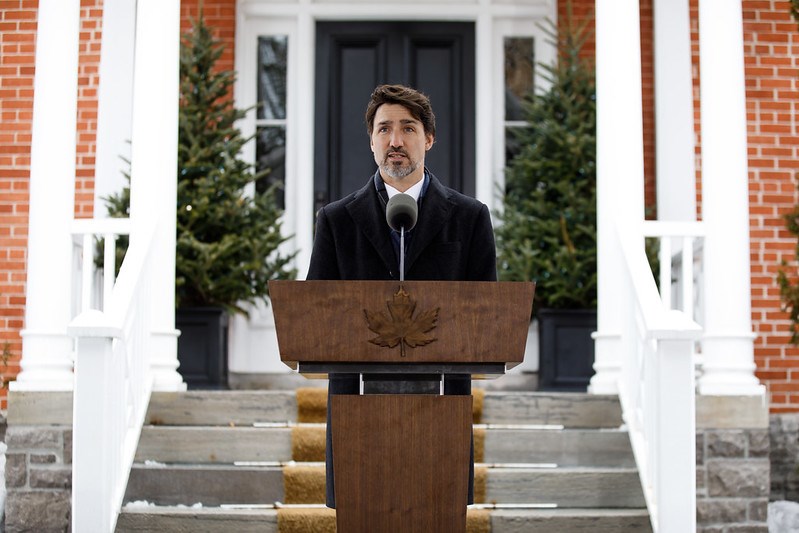Global problems require global solutions. With COVID-19, however, we’re seeing that our governance mechanisms don’t drive global solutions even when our lives depend on it.
This is a problem because it will lead to diminishing trust in public institutions and a dragged-out pandemic response, as we fail to prevent deaths, long-term disability and lasting economic hardship of millions.
To end this pandemic, Canada must act with foresight, but what does that mean?
Simple won’t cut it
Earlier this month, Prime Minister Justin Trudeau invited Canadians to, once again, get vaccinated: get your first shot, your second shot, your booster, vaccinate your children, and let’s get out of this pandemic for good, he said.
The problem is, we alone will not end this pandemic.
In the current global landscape, the virus outsmarted us. Global vaccine roll-out has been inequitable: less than three per cent of people in low-income countries have been vaccinated as the richest countries hoard vaccines, and refuse to support waivers on COVID-19 vaccine patent rights or to keep pharmaceutical companies from bullying middle- and lower-income countries.
As scientists warned, COVID-19 kept mutating, and the latest variant in the series — Omicron — largely escapes our immune resistance. Enter school closures, preventable deaths, chronic diseases, social isolation, anxiety, depression and so on.
But the answer is not to boycott boosters out of guilt, while globally, millions are waiting on their first dose. The sooner we all get our shot, the easier it will be to advocate for Canada and other countries to stop vaccine hoarding.
By March, G7 countries will have 1.4 billion surplus vaccine doses and we have seen our governments let them expire before.
This is not an issue of national versus global interest. We need a plan that encompasses both. Right now, there is no such plan.
What about international cooperation?
The G7 Summit in June 2021 ended with leaders of the seven richest countries promising to deliver an inadequate portion of vaccines to countries without supply — a promise on which they managed to under-deliver.
The announced measures included no future scenario mapping, no international mechanisms of collaboration that go beyond the ineffective charity models. This means we are failing to account for the challenges we can assume are ahead of us and failing to co-ordinate with our global partners on solving them.
Our leaders returned from the summit asking us to basically keep throwing buckets of water at a raging forest fire. As the fire spread, we grew frustrated with each other for not doing enough.
A different model, one based on collaboration, is possible.
Argentina, Mexico, Bolivia, Cuba, Venezuela and political leaders across 20 countries, health experts and vaccine manufacturers organized an alternative summit, triggering agreements of scientific and economic collaboration.
Cuba developed its own highly effective vaccine and committed to equitable distribution, with exports to Vietnam and Venezuela in progress.
Pediatrician Peter Hotez and his team at Texas Children’s Hospital developed a vaccine produced in India and Indonesia, and are sharing patents, technology and making partnerships with the two countries, Bangladesh and South Africa with the goal of distribution across sub-Saharan Africa.
The issue is, as Dr. Hotez notes, G7 countries and global policy makers are not helping.
The fundamental problem with Canada’s COVID response
Currently, the COVID-19 response is backwards: the solutions are global yet policy-makers and governments are focused on reactive national and sub-national policies.
Global mechanisms (like the COVAX initiative) lack, as United Nations Secretary General António Guterres admitted, teeth — with limited funding and decision-making resources.
In panic and fear, the world’s richest countries replaced foresight and strategic planning with medieval tactics: put up the trenches, hoard resources, isolate the vulnerable, hold down the fort … too bad the enemy is airborne.
Places like Canada struggle with co-ordination between provincial and federal governments. Outdated approaches to federalism have resulted in insufficient collaboration around the procurement of essential goods and equipment, poor policy co-ordination (like travel and health policies), incoherent province-to-province health measures, inconsistent public messaging, and an isolationist view that disregards the consequences of global inaction.
Switching the script
As we enter 2022 with closed schools, overwhelmed hospitals and an isolated, tired and scared population we have a choice. We can keep blaming each other or act with fortitude and foresight. Canada’s public should listen to health experts, but also demand a coherent future-oriented strategy.
Our strategies must account for global, national and regional agendas. They must address risks and opportunities across public health, trade, international relations, infrastructure, social safety nets and public narratives. And methods to guide this work already exist.
Labelled as foresight, these include innovative models for strategic planning based on future-oriented risk and opportunity mapping, scenario-testing, solution-building and policy-making. Research groups (like the Hawaii Research Center for Futures Studies or the Futures of Social Innovation Lab at the Ontario College of Art and Design University), the UN are all using these approaches.
Countries around the world, from small island states like Cape Verde and Mauritius to global leaders in innovation like Rwanda and the European Union have all been investing in foresight capacity.
Canada should leverage foresight to strengthen its federal model and the COVID-19 response. Combining existing and the emerging data, exploring new possible pathways, addressing existing but also future risks and identifying new forms of partnerships is urgent.
This will require prioritizing public health over profits, upholding lived experiences, trusting technical experts and remaining adaptive. Canada’s strategy must account for federal and national mandates but also the importance of global engagement. Without it, we will be living on borrowed time, waiting for a new variant, a new booster, a new quick fix.
Gloria Novovic has previously worked with Cooperation Canada and consults for Canada's international cooperation sector. Her research on global governance has been funded by the Ontario Trillium Foundation, the International Development Research Centre of Canada, and the Ontario Trillium Foundation.




